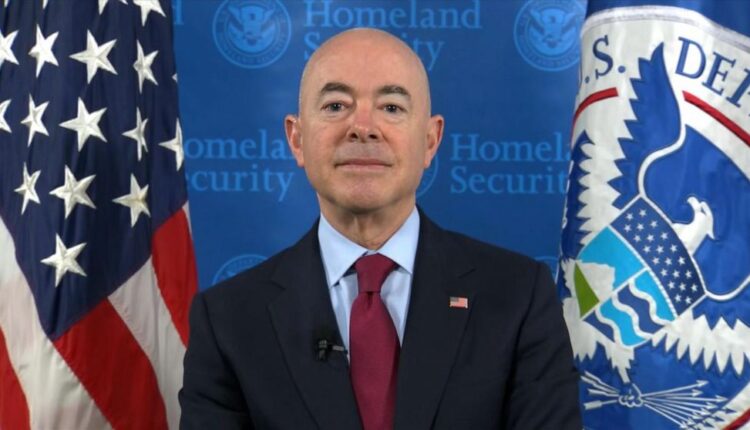 Homeland Security Secretary Alejandro Mayorkas
Homeland Security Secretary Alejandro Mayorkas
‘Shameful’: Biden DHS chief says Haitian and Cuban refugees will be turned away
By Julia Conley / Common Dreams
Human rights advocates on Wednesday condemned the Biden administration for its “shameful” announcement that amid unrest and economic crises in both Cuba and Haiti, refugees from the Caribbean nations will not be welcomed in the United States.
At a press conference on Tuesday, Homeland Security Secretary Alejandro Mayorkas—whose own family left Cuba for the U.S. in the early 1960s—said people who attempt to leave Cuba and Haiti via boat will be intercepted by the U.S. Coast Guard and either turned back or—if they convince U.S. authorities that they have a credible fear of persecution or torture—sent to a third country for resettlement.
“Allow me to be clear: If you take to the sea, you will not come to the United States,” said Mayorkas.
“The time is never right to attempt migration by sea. To those who risk their lives doing so, this risk is not worth taking,” he added, echoing the words of Vice President Kamala Harris in a recent speech discouraging Central Americans from crossing the southern U.S. border as well as immigration officials during the Trump administration.
Mayorkas’s stern warning to people in Haiti and Cuba comes amid turmoil in both countries. U.S.-backed Haitian President Jovenel Moïse was assassinatedlast week after presiding over a corrupt and increasingly authoritarian government. According to Politico, U.S. officials traveled to the country on Sunday to discuss the government’s request for U.S. assistance, amid calls from the Washington Post editorial board and others for a U.S. military intervention.
In Cuba, thousands of people held demonstrations over the weekend amid economic strife that’s been worsened by the coronavirus pandemic and has been fueled by the decades-long U.S. trade embargo targeting the island.
The Haitian Bridge Alliance said Mayorkas’s comments represented the Biden administration’s decision to “default to Trumpian cruelty” regarding refugees from the Caribbean.
“For Secretary Mayorkas to respond to the once-in-a-century event of the assassination of Haiti’s president with such callous disregard in in these remarks, it begs the question as to how much Black lives actually matter to this administration,” said Guerline Jozef, co-founder and executive director of the Alliance. “These comments are callous, heartbreaking, and most of all ineffective.”
“The racial overtones of this message is not lost on our communities, particularly the Haitian community, which has time and time again been discriminated against—in the 1970s, 80s, 90s, and again today. How many lives must be lost before the U.S. provides safety for asylum seekers? If they were coming from Norway would the U.S. then welcome them with dignity?”
Anika Ades, a Masiyiwa-Bernstein fellow at Human Rights First, was among those who took issue with Mayorkas’s suggestion that reaching the U.S. by boat is an illegitimate method of seeking asylum.
“Seeking asylum by sea is legal and life-saving,” said Ades.
“Yet again, advocates must remind this administration that seeking asylum is legal,” said Katharina Obser, acting director of the Migrant Rights & Justice Program at the Women’s Refugee Commission. “WRC is gravely disappointed by Secretary Mayorkas’s repeated insistence on rejecting desperate families, children, and single adults from our borders, whether by foot or by sea. Using third countries to turn away people arriving at our shores will disproportionately harm Haitian and Cuban migrants, among many others, who already have families in the United States.”
Amnesty International denounced the Biden administration’s message to refugees as “shameful” and accused the U.S. government of “a horrible turning away from the administration’s promised commitment to human rights and racial justice.”
“At a time of acute crisis in Haiti and Cuba, the U.S. should be fully upholding the right to seek asylum, not curtailing access based on how people arrive, processing them offshore, and then resettling them in a third country,” said Denise Bell, a researcher for refugee and migrant rights at the organization. “On the 70th anniversary of the Refugee Convention, no less, we should be commemorating, not spurning, our human rights obligations.”
Mayorkas said that in recent weeks, 20 migrants have died at sea en route to the United States, but the U.S. Coast Guard has not seen a surge in Cuban or Haitian migration at this point. The Coast Guard has been deployed to monitor migration in the Florida Straits and Caribbean Sea and intercept boats from the two countries.
“Seeking asylum and protection is a human right protected by international and domestic laws,” said Efrén C. Olivares, deputy legal director for immigrant justice at the Southern Poverty Law Center. “It is disappointing to see Secretary Mayorkas, himself the son of Cuban refugees, attempting to foreclose that right for Cuban and Haitian nationals when they most need it. His office should instead be figuring out ways for those asylum seekers to safely apply for asylum.”
Mayorkas’s statement, Olivares said, served as “a reminder that, regardless of which party is in office, the fight for the human rights of immigrants and people seeking protection is as important as ever.”

